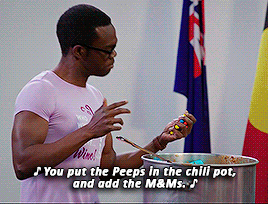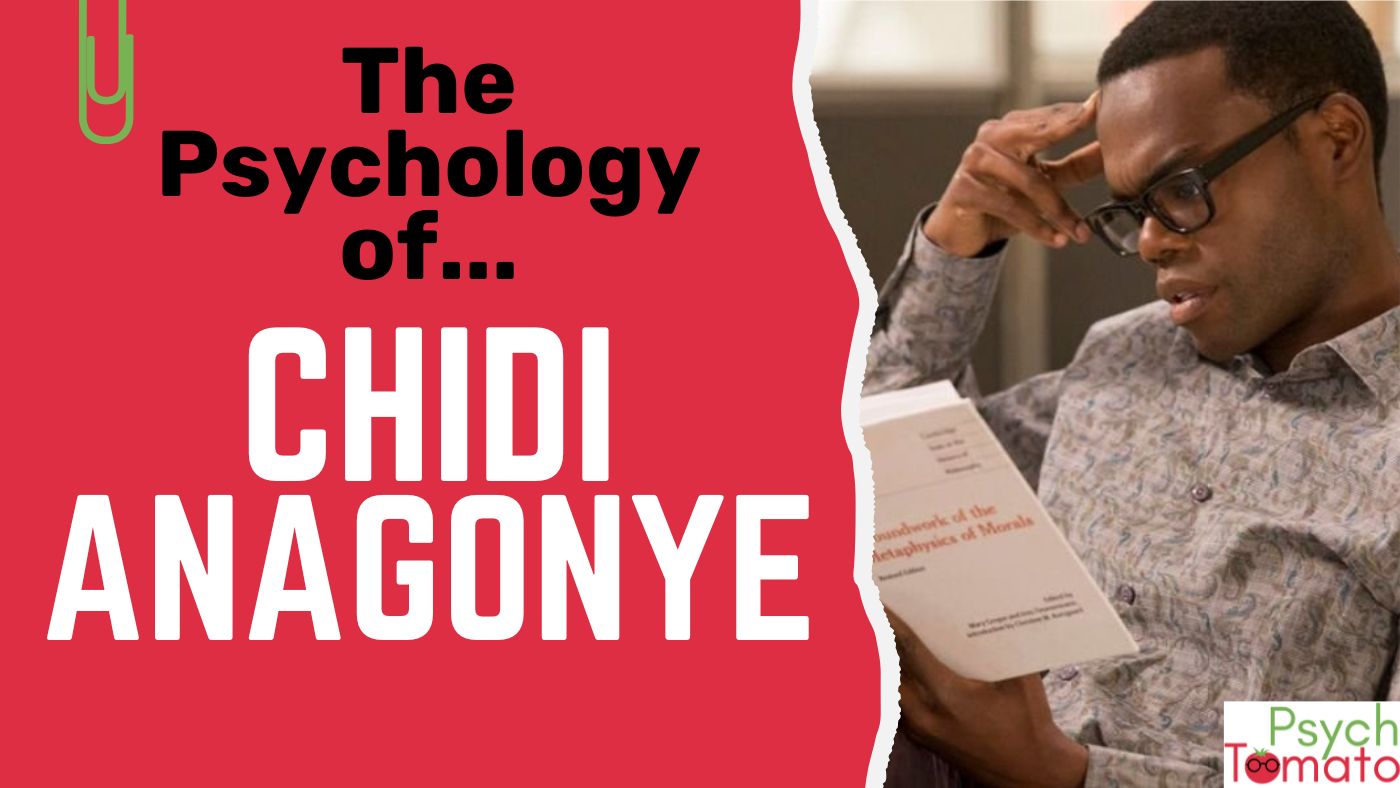Chidi Anagonye is the ultimate moral philosopher. In fact, he’s so committed to doing the right thing that he often can’t do anything at all.
His story is a hilarious and heartfelt exploration of how anxiety, overthinking, and the weight of ethical responsibility can lead to “analysis paralysis” and, at its breaking point, to total meltdown and absurd nihilism.
So put on your red boots, grab your lucky bookmark, and get ready to dive into the psychology of Chidi in The Good Place!
Quick Disclaimer
“The Good Place” is one of my favorite shows, so I’m very excited for this article.
However, this isn’t going to be a full character analysis of Chidi Anagonye. Instead, we’re wanting to use Chidi as an example of a few psychological concepts that are key to his character.
Additionally, there might be some spoilers for “The Good Place” in this article, so do be warned.
With that out of the way, though, let’s get into it!
Meet the Character
Chidi Anagonye is a Senegalese ethics professor who finds himself in the afterlife’s “Good Place.”
Chidi is a good guy. In fact, he dedicated his entire life to learning what it means to truly be a “good” person! Right out of the gate, it’s apparent that he’s earnest, compassionate, and deeply committed to moral philosophy.
But his devotion to doing the right thing is matched only by his crippling indecision. He can’t even choose what to eat for breakfast without spiraling into anxiety, trying to determine what the “right” choice is.
In fact, it was this indecisiveness that led to his death in the first place. Unsure of where to stand to dodge a falling AC unit, he is crushed under it and wakes up in “The Good Place.”
As the show unfolds, Chidi’s struggles with choice, responsibility, and guilt become both a source of comedy and a poignant look at the human condition.
Spotlight Scenes: The Paralysis of Overthinking (and the Meltdown That Follows)
Chidi’s indecision is truly legendary. He lost a dog that he never named, he was recorded in a medical journal for being the youngest person to ever get ulcers from stress, and his inability to make a decision constantly alienated those around him in life.
When tasked with helping Eleanor become a better person, he creates elaborate lesson plans and philosophical debates, but often stalls when action is needed.
Perhaps the most iconic example is during the tests given to the group by The Judge to determine if they have genuinely improved their moral character. Chidi faces the near-impossible task of… choosing which of two hats to wear… While he completes his test, the fact that he took 82 minutes to make a decision means that he failed his test.
The pressure of constant moral decision-making mixed with learning about the afterlife (and Jeremy Bearimy, of course) eventually pushes Chidi to his breaking point.
In a now-infamous scene, he has a full-blown existential crisis in front of his ethics class.
Abandoning his lifelong quest for moral clarity, Chidi embraces nihilism, declaring that nothing matters anymore. To the horror of his students, he then proceeds to make a “chili” out of M&M’s, Peeps, and garbage chili, stirring the concoction with wild abandon and announcing his plans to eat the entire pot of it with a manic grin.
The moment is funny, but it’s also deeply sad. It shows how the relentless pursuit of the “right” answer can lead to total collapse and absurdity.

The Psychology Behind the Paralysis
Chidi’s struggles are a classic case of what’s called analysis paralysis, i.e., the inability to make a decision due to overanalyzing options and potential outcomes.
A common example of this is when a restaurant has a massive menu with hundreds of options that makes you suddenly freeze up with no idea what you’re hungry for. Your brain wants to make the “best” choice, but there are just so many options that it freezes. Now you’re on your third drink refill, and the server is getting visibly irritated at you asking for “just a little bit more time” for the ninth time, and you’re still hungry!
Psychologists call this “maximizing”: always searching for the absolute best choice, which often leads to anxiety, regret, and inaction. Chidi’s desire to be perfectly ethical in every decision makes it nearly impossible for him to act at all.
It’s not too surprising that this behavior is closely tied to perfectionism and moral scrupulosity, where the fear of making the wrong choice or causing harm becomes overwhelming. Chidi’s moral anxiety is so intense that even trivial choices (like which chair to sit in) can trigger his anxiety and lead him to make bizarre decisions (like sitting on the arms of the two chairs put together).
Maximizing, especially when there’s the factor of the moral component, such as in Chidi’s case, creates a ton of pressure on the individual.
When the pressure becomes unbearable, the mind can swing to the opposite extreme: nihilism.
Chidi’s breakdown and his “nothing matters” chili are a form of psychological surrender, a way for his overwhelmed brain to escape the impossible burden of always doing the right thing.
This kind of collapse isn’t uncommon: when people feel trapped by perfectionism or anxiety, they may temporarily abandon their standards altogether, often in self-sabotaging or absurd ways.
Chidi also exemplifies decision fatigue, which is the mental exhaustion that comes from making too many choices, especially when they feel high-stakes. Over time, this leads to avoidance, procrastination, and even physical symptoms like stomachaches (which Chidi experiences very regularly).
Beyond the Afterlife: Why It Matters
Most of us have, at some point or another, felt overwhelmed by choices or paralyzed by the fear of making a mistake, which helps us empathize with Chidi.
In a world with endless options and constant pressure to “do the right thing,” analysis paralysis is more common than ever.
If you want to buy a new vacuum cleaner, there is a wide range of features and specifications you then start to compare across the never-ending assortment of brands and styles. As you go down rabbithole after rabbithole, next thing you know, you’ve learned more than you thought you ever would about vacuum cleaners, yet you still haven’t bought one because of your pursuit of the “right” one.
From the outside looking in, it seems ridiculous, right?
But when you’re in that analysis-paralysis moment, it feels truly necessary to weigh all of the factors and options. (I’ll be the first to confess that I’m personally VERY prone to this exact kind of situation.)
Understanding the psychology behind indecision (and the risk of burnout and nihilism) can help us develop compassion for ourselves and others.
It’s a reminder that striving for perfection (whether moral or otherwise) is admirable, but sometimes, it’s more important to take action even if the choice isn’t perfect.
As Chidi learns, living a good life isn’t about never making mistakes; it’s about learning, growing, and moving forward despite uncertainty.
Tomato Takeaway
It’s easy to dismiss indecisiveness as a lack of willpower, but research shows it’s often rooted in anxiety, perfectionism, and a strong desire to do good.
Chidi’s paralysis isn’t laziness. It’s the result of caring deeply about the impact of his actions, sometimes to a fault
Chidi Anagonye’s story shows that the quest to be perfectly good can sometimes get in the way of actually living. The answer isn’t to stop caring, but to accept that imperfection is part of being human. Sometimes, making a choice (any choice!) is the most ethical thing we can do.
And if you ever find yourself making M&M’s Peeps Chili, it might be time for a break… Just saying…
Fueled by coffee and curiosity, Jeff is a veteran blogger with an MBA and a lifelong passion for psychology. Currently finishing an MS in Industrial-Organizational Psychology (and eyeing that PhD), he’s on a mission to make science-backed psychology fun, clear, and accessible for everyone. When he’s not busting myths or brewing up new articles, you’ll probably find him at the D&D table or hunting for his next great cup of coffee.


